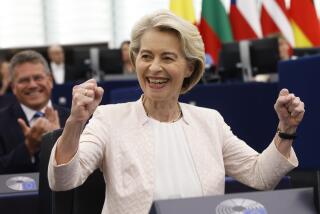Balloting to Start for Strengthened European Parliament : Elections: Voters in four EU nations go to the polls Friday, the rest on Sunday. The lawmakers will have a role reviewing the Maastricht Treaty.
- Share via
BRUSSELS — Citizens of the 12-nation European Union begin voting Friday to elect members to their international Parliament, a body that has recently gained important new powers but remains remote and mysterious to most of its constituents.
Elections to the 567-seat European Parliament will start with voting in Britain, Ireland, Denmark and the Netherlands. They finish Sunday in the EU’s eight other member states. Preliminary results in what are the world’s only multinational elections are expected late Sunday night.
The elections are considered the most important since the assembly was created more than 40 years ago for one simple reason--as Western Europe moves toward deeper economic and political integration, the European Parliament has gained more strength.
To be sure, it still is overshadowed by traditional power bases in national legislative assemblies. Even within the EU, it is the member states, sitting collectively as the Council of Ministers, that hold real sway. The Parliament also suffers key shortcomings, including an inability to introduce its own bills or to deal with foreign policy matters.
But the European Parliament today is a far cry from its modest origins as a toothless, consultative arm of the European Coal and Steel Community in the early 1950s. It presides over the EU’s $80-billion annual budget, and since the Maastricht Treaty took effect in November, it has gained “co-decision” authority with the council in several areas, including education, the environment and consumer affairs.
It has also won the right to review and veto key appointments to the Union’s Executive Commission and reject new prospective member states--an especially important power as the new, post-Communist democracies in Central and Eastern Europe begin to line up for membership.
Of far greater potential significance, however, is the promised role for the new Parliament in the 1996 intergovernmental conference that will review the Maastricht Treaty--a de facto constitutional convention on the future of Europe.
“The elections of 1994 offer voters a greater chance than ever before to influence decision-making in Western Europe,” concluded a study released recently by the London-based Royal Institute of International Affairs. “For the first time, they will be electing (members) who have the potential to exert a real impact on legislation.”
The Parliament is expected to grow more in stature and importance as measures mount to build a greater degree of direct democracy into the process of European unification.
It is already one of the world’s more unusual elected assemblies. Its elections are conducted under 12 sets of ground rules. Voters will choose a Parliament that debates in nine languages, whose home is considered to be Strasbourg, France, but whose 19 committees reside in Brussels and whose records are kept in Luxembourg.
Public interest in the elections has been low, debates on crucial European issues are infrequent and knowledge about the candidates is virtually nonexistent.
“I work in the European policy field, and I don’t even know the candidates running in my constituency,” admitted Franz-Josef Meiers, a researcher at the German Foreign Policy Assn. in Bonn. “These people are invisible.”
There are exceptions, of course.
Singer Nana Mouskouri is running in Greece. Prime Minister Silvio Berlusconi heads the Forza Italia (Go Italy) candidate list in Italy. Two former prime ministers are among the Christian Democratic hopefuls in Belgium, while former Prime Minister Poul Schlueter is campaigning for one of Denmark’s 16 seats. In France, Michel Rocard, leader of the opposition Socialists, and Jean-Marie Le Pen, of the ultra-rightist National Front, are candidates.
Among the hopefuls, a handful of fiery, colorful individuals have even forced real European issues into the campaign on occasion.
In Germany, a disgruntled former Brussels bureaucrat named Manfred Brunner, who heads a group called the Free Citizens’ League, has railed against corruption in the EU bureaucracy and the Union’s liberal subsidies to poor regions.
In France, a slate running under the name The Other Europe advocates European political integration, new tariffs to protect internal markets and renegotiation of recently completed world trade talks.
But for the most part, the campaign has been dominated by big parties and national political figures, who have co-opted the election, making it more a series of domestic referendums than a vote on the future shape of a united Europe.
In Italy, the election is seen mainly as an initial test for Berlusconi’s new government in Rome; in Spain, it will be judged as a barometer of Prime Minister Felipe Gonzalez’s attempts to stay in power. In Germany, this contest is considered only one of several preliminary rounds ahead of next October’s main event--the Bundestag elections. In Britain, the only real issue is the future of John Major’s beleaguered government, which does not seem bright.
More to Read
Sign up for Essential California
The most important California stories and recommendations in your inbox every morning.
You may occasionally receive promotional content from the Los Angeles Times.













